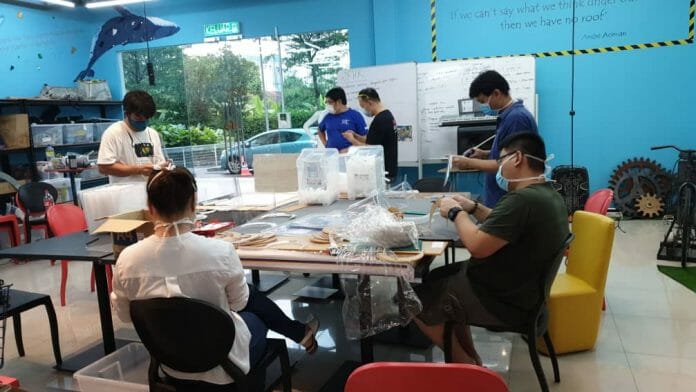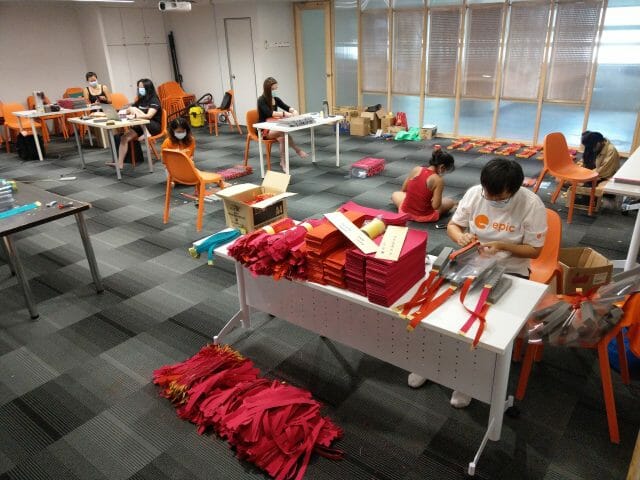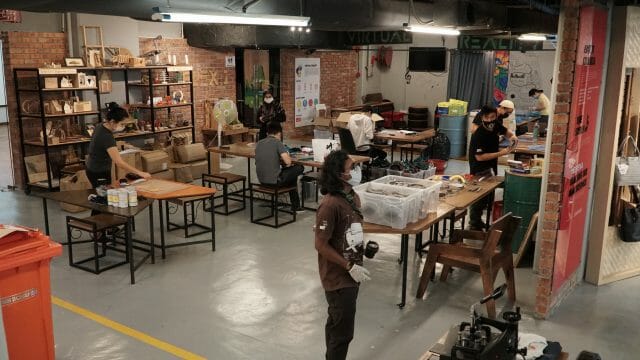In the midst of this ‘black swan’ event, the Covid-19 pandemic, businesses and supply chains globally have been disrupted causing everything to halt.
So, how, in a matter of days, did a community of makers manage to activate an economy halted by a virus, and mobilise a relief initiative to raise almost RM135,000 to produce over 20,000 units of face shields?
A group of social enterprises like the Me.reka, Taylor’s Me.reka Makerspace, Biji-biji Initiative and their network of partners were able to engage communal resources to maximise collective impact to support our Malaysian frontliners.
The ideology behind the initiative is simple.
“Global issues require localised solutions.”
But, taking a fashionable statement and ensuring that it’s powerful buzzwords are able to pack as much impact as the meaning behind it is where the real answer lies.
Leverage to create bigger impact
A decentralised digital production platform is what took the collective’s global thought into a localised context.
Through the years, Me.reka and Biji-biji Initiative amassed a network of makers, innovators, suppliers and logistics providers across Malaysia.
They realised that their individual efforts alone would be unparalleled to a whole community of suppliers, producers, and logistics. It is imperative for each partner to leverage from each other’s capacity and resources to ensure a larger collective impact.
Hence, a decentralised model of production, capacity building, and impact creation was initiated. It was no longer about what they could do by themselves, but rather how they could communicate effectively with others to ensure the desired impact is reached at greater efficiency.
What started with a call for production partners to help build face shields for the frontliners, quickly became a digital platform that connected entire communities towards offering relief.
An open-source methodology allowed for the groups’ designs, knowledge, resources, and expertise to be shared.
Within days, this initiative onboarded over 30 partners wanting to contribute in their own capacities. Producers and makers lacking supplies from different states are connected with a network of supply chains, frontliners in need of PPE’s are able to make requests and have them filled by various partners.
The decentralised platform allowed everybody to tackle the same issue, communally and locally.
Digital mobilisation as the future of making
At present, the digital platform has delivered 20,340 units of face shields with an additional 21,900 replacement parts. Due to the increasing demand and necessity at the frontlines, the team also developed methodologies for producing spacers (Aerochambers) and patient isolation boxes (Intubation Boxes), delivered 1495 and 56 units respectively.
In total, Me.reka, Taylor’s Me.reka Makerspace and Biji-biji Initiative have delivered these PPE’s across Malaysia to 44 Hospitals, 11 Clinics, 3 PDRM’s and 7 organisations at the frontlines.
These numbers are made publicly available through the platform, https://mereka.my/protecting-our-frontliners/
Individualism and the notion of “I win, you lose” will no longer be supported
In a statement, Group CEO of Biji-biji Design Sdn Bhd, the holding company of the collective, Rashvin Pal Singh, states that the most useful utilisation of this time they have been given, is through reflection.
“Reflection of our past methods, of our current stance, and our future progressions.”
“Trauma has a way of uniting us, this pandemic that we are facing as a family, community, country and globally has brought us together,” he says, adding that their initiative serves as empirical evidence that digital collaborative efforts will drive future impact and economies.
The collective firmly believes in reimagining the future of making. Implying that through digitally-empowered communities with localised access to tools, technologies and talents will allow for paradigm-shifting impact and innovation to materialise.
The future of work will compel people to work together, leveraging off each other’s resources and building upon a communal capacity.
Me.reka and Biji-biji Initiative foresees more collaborative working efforts between various players across industries, with a greater need for assets and resources sharing.
The collective aims to build upon this decentralised platform, allowing individuals and communities to access the machines, resources, and spaces, with the talents and expertise and the designs and content towards mobilising rapid solutions and fostering collaborative and innovative approaches.
“This is the future of the maker movement. In moments of crises, it is not the singular forces monopolising our markets that will come to the aid. It is the power and effort of the community, working in tandem and complimenting each other’s efforts that will bring true collective impact”, Gurpreet Singh Dhillon, Group CTO of Biji-biji Design Sdn Bhd, says.
Aligned with the idea of moving forward together, the collective understands that they cannot do this alone. The platform’s aim is to maximise global capacity, and to do so, it needs to scale.
The collective has been liaising with organisations across the region including Vietnam Fablab and Guam Makerspace to help expand the decentralised effort. They were featured as a part of the Obama Foundation Leadership Network as a scalable solution with the potential as a crisis relief initiative and with being able to mobilise and engage a community of under-utilised resources.
The efforts on this platform is a very timely measure, with the Ministry of Health (MOH) announcement on April 13 that there is an increase demand for PPE’s and the lack of stock to fulfill the need.
Health director-general Datuk Dr Noor Hisham Abdullah, said in a statement that the use of PPE has risen by two to 10 times more than the normal use and the MOH has only two weeks’ worth of PPE stock left.
“If NGOs want to donate, please donate PPE to MOH. We are still welcoming PPE donations”.
The announcement made clear the necessity for such local initiatives to help support the
ever-increasing demand for PPE’s.
As such, Phase 2 of the platform is currently under works, to provide for more PPEs such as gowns, to the frontliners. The function of the platform is to be easily deployed to mobilise future relief efforts, by connecting people with the tools and technologies, to the communities needing these, within their local vicinity.
The platform will see unique features to provide accessibility to the B40 and marginalised community to these tools and technologies, and will be viable through credits obtained from corporate sponsorships and partnerships.
The collective is inviting interested partners, experts and funders to join and build the platform together to enable it to grow exponentially.
In particular, Me.reka and Biji-biji Initiative are looking for corporate and foundation partners to further develop this platform into a regional solution.
They hope the platform will bring about a long lasting change, with proper impact measurement metrics in place.
Surina Shukri, CEO of Malaysia Digital Economy Corporation (MDEC), applauded Biji-biji
Initiative on utilising a digital platform to convene communities to collaborate on solutions to address the urgent needs of our frontliners in the war against Covid-19.
The team can be reached via this link if you would like to join as a partner, funder or provide technological expertise! (or visit, https://merekahq.typeform.com/to/reN9Wc)











